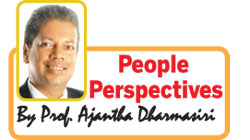HR Quiz 2015: the quest to be the best
 It was an impressive show of young talent at the recent HR Quiz 2015.
With 50 teams representing leading corporates, a battle between
brilliant brains took place. I remember the first ever HR Quiz in Sri
Lanka organized by the Institute of Personnel Management (IPM Sri Lanka)
last year where I was head of the panel of judges. It was an impressive show of young talent at the recent HR Quiz 2015.
With 50 teams representing leading corporates, a battle between
brilliant brains took place. I remember the first ever HR Quiz in Sri
Lanka organized by the Institute of Personnel Management (IPM Sri Lanka)
last year where I was head of the panel of judges.
As head of the panel of judges, this time too, my task was quite
comprehensive. Today's column is a reflection of HR Quiz 2015 in the
broader context of Human Resource Management (HRM) in Sri Lanka.
There is a growing awareness and enthusiasm on people management in
Sri Lankan organizations. This is evident by the increasing number of
activities related to Human Resource Management (HRM) on many fronts.
Yet, we have a long way to go in unleashing the true potential of our
productive workforce, in the wake of post-war economic expansion and the
development drive.
One key element in such an endeavour is to have clarity of what
really HRM is all about. The HR Quiz has come to the forefront enriching
us on this aspect.
There are hundreds of ways of describing HRM. Some are over
simplistic while some others are highly scholastic. What is the best way
to approach HRM in defining it related to local needs?
A think tank from the Institute of Personnel Management (IPM) took
the initiative of developing a suitable definition of HRM for Sri Lanka.
This move is very significant with IPM being the pioneering and premier
HR institute in Sri Lanka, moving towards Charter status.
Our approach was specific and straightforward. We looked at what was
available in terms of HRM definitions, identified salient points and
listed them and brainstormed its relevance to Sri Lanka. That was one
aspect. On the other hand, we also had brainstorming sessions on how to
accommodate the socio-cultural and religio-political dimensions
influencing management practices in Sri Lanka. Our aim was to find the
best fit. Based on the brainstorming sessions we had as a team and
feedback from professionals and professors, the following definition
emerged:
A strategic and integrated approach in acquisition, development and
engagement of talent, using relevant tools, with proper policies,
practices and processes in creating a conducive climate to achieve
organizational excellence and societal well-being (IPM, 2014).
The end result of all HR endeavours, the way we see it, has twin
aspects, Organizational Excellence and Societal Well-being. What we mean
by organizational excellence is its overall performance with continuous
improvement. It, obviously, includes financial results, customer
satisfaction, process efficiency and people development, the four
perspectives of a typical balanced scorecard.
HR professionals cannot function in isolation ignoring social
realities. This is more relevant to a developing country such as ours,
where issues such as poverty, unemployment and ethnic tensions cannot be
ignored.
That's why we included Societal Well-being as a key outcome of HRM.
It highlights the need to support people outside the organization and
protect the environment as well.
Defining HRM clearly was one step towards delivering sustained
results. We need to put the acts together, in ensuring awareness,
appreciation and application among Sri Lankan HR professionals.
 In bringing HRM to the forefront, initiatives such as the HR Quiz
occupy a prominent place. The necessity of finance for an organization
is more easily understood than the need to have right person in the
right place. HRM is slowly moving to the top. More emphasis on
people-matters in the board rooms through sub-committees is an
encouraging sign. In bringing HRM to the forefront, initiatives such as the HR Quiz
occupy a prominent place. The necessity of finance for an organization
is more easily understood than the need to have right person in the
right place. HRM is slowly moving to the top. More emphasis on
people-matters in the board rooms through sub-committees is an
encouraging sign.
The key feature of the HR Quiz was the enthusiasm and engagement of
the young employees representing their institutions. They were not
necessarily from the department of HRM. The spirit of actions and the
synergy of interactions were indeed significant. It was a battle of the
brains with regard to people management.
High tech
The use of high tech was a remarkable feature of the HR Quiz program.
The responses of each team were relayed within seconds, summarized and
the results were displayed on the wide screen efficiently.
There were a wide range of questions on various aspects of HRM. There
were also questions on current affairs and sports. Some questions were
easy and others were tough. There were questions based on brief video
clippings as well. All in all, it was an enriching endeavour.
The spirited cheer whenever a team got the right answer was very
evident. As the quiz progressed from round one to two and so on till the
final round, the rise in energy level among the participants was
demonstrated through their applause. Questions for the audience also
added variety to the HR Quiz.
HRM
We are witnessing a growing awareness among the corporate fraternity
on the aspects of HRM. This welcome sign should be well nurtured to
ensure the rich harvest of human potential. People are being
increasingly recognized as a factor that gives the competitive
advantage.
As it has always been the case, the private sector, with much
influence from the multinational corporations has spearheaded the best
HR practices. The public sector is sadly lagging behind with overly
emphasized domain of administration, neglecting the learning and
development aspects. It appears as an interesting case where the engine
of growth (private sector) has better people practices than the
so-called driver of the engine (public sector).
People development cannot take a back seat if we are to grow as a
nation. Sound practices of strategic HRM will be one sure way forward in
ensuring the balance between organizational goal attainment and employee
development.
The HR Quiz 2015 with fifty teams, created a motivating momentum for
people managers to engage in an intellectually stimulating experience.
The positive vibrations which emanated at the HR Quiz 2015 were
encouraging to decision-makers. The need to be more professional in
making people management decisions across a wide cross-section of
society has been already felt. In essence, HRM should be practised in
the private and public sectors for better results.
Prof. Ajantha Dharmasiri can be reached through
[email protected] or
www.ajanthadharmasiri.info
|

